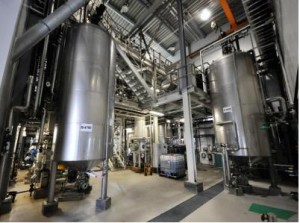BIOFOREVER (BIO-based products from FORestry via Economically Viable European Routes) is a three years project that will demonstrate the feasibility of a commercial scale biorefinery in Europe.
Background
Fossil based resources currently make up the majority of chemical building blocks and therefore represent a series of environmental and economic challenges. These challenges include issues related to global warming, increasing raw material prices and high volatilities to security of supply (long- term depletion).
The forest regions of the EU-27 are equipped with a large supply of biomass resources (25 billion mᵌ growing stock) that are not in competition with food supply. In combining woody biomass supply, chemical production and European expertise in wood processing, it is expected that lignocellulosic feedstock will soon become a key strategic resource for chemical intermediates, building towards this goal is the priority of BIOFOREVER.
Producing chemical building blocks from woody biomass
Following the introduction of cane sugar ethanol as a biofuel in Brazil in the 80’s and corn ethanol, particularly in the US over the last two decades, the discussion about the use of agricultural land for biofuels production has resulted in initiatives aimed towards developing and implementing technologies for the production of advanced biofuels, i.e. biofuels produced from agricultural or forestry residues or from so called lignocellulosic energy crops on marginal land. Several companies have invested in commercial scale cellulosic ethanol plants in order to demonstrate the technical and economic viability of their technologies.
The intention of the BIOFOREVER consortium is to raise the bar even further by demonstrating the viability of technologies that can produce clean cellulosic sugars; sugars that can be used as a feedstock for fermentation processes to produce various chemical building blocks (ethanol, butanol, FDCA, a.o.), enzymes and vitamins. The consortium will focus on using woody biomass as a feedstock, e.g. spruce, poplar and waste wood and the technology partners will convert these feedstocks in their demonstration plants on tons scale to cellulosic sugars a.o.
Four conversion technologies will be demonstrated
One of the challenges of the BIOFOREVER project is the production of cellulosic sugars that are clean enough for the production of various bio-based products. Contrary to ethanol, where distillation is used for downstream processing, other chemical building blocks require crystallization as DSP, starting from a black liquor type of substrate will then not deliver the required product specifications.
Four partners in the BIOFOREVER consortium have developed technologies that can produce clean sugars from lignocellulosic biomass:
-

BALI Demo Plant, Sarpsborg
NorwayAPIEurope’s AVAP technology is an organosolv technology that has been demonstrated for a couple of years already in their Thomaston demonstration plant in Georgia, USA.
- Avantium’s Zambezi technology is using concentrated hydrochloric acid in their demonstration facility in The Netherlands that is scheduled to be operational over the course of 2018.
- Borregaard’s BALI technology is a biorefinery concept developed production of lignin performance chemicals and cellulosic sugar. The technology has been scaled up and demonstrated in the Biorefinery Demo plant, a 1 mt/day facility located in Sarpsborg, Norway. The BALI technology has been demonstrated for a couple of years in their Sarpborg’s demonstration plant in Norway.
- DSM is collaborating with the Bioprocess Pilot Facility in Delft, Netherlands to demonstrate a mild acid/steam explosion technology in combination with their proprietary enzymes technology.
Realising a commercial scale biorefinery
The ultimate goal of the BIOFOREVER project is to have one or more bio-based value chains commercialised in Europe. Biomass availability at affordable prices; private equity contribution and public financial instruments are important topics that are being addressed by the consortium partners. So far 20 European sites have shown an interest to develop and host a biorefinery project. 5 sites have been selected to do a ‘deep dive’ in order to assess the feasibility of a commercial biorefinery project. The aforementioned ‘deep dive’ will facilitate a go/no go decision to start basic engineering for a biorefinery by mid-2019.
BIOFOREVER (BIO-based products from FORestry via Economically Viable European Routes) is a three years project that will demonstrate the feasibility of a commercial scale biorefinery in Europe. It is supported by the Bio Based Industries Joint Undertaking-BBI JU – a cooperation between the Bio-based Industry Consortium and the European Commission. The project group consists of fourteen partners from seven countries.
This project has received funding from the Bio Based Industries Joint Undertaking under the European Union’s Horizon 2020 research and innovation program under grant agreement No 720695.
Further information: https://bioforever.org/



